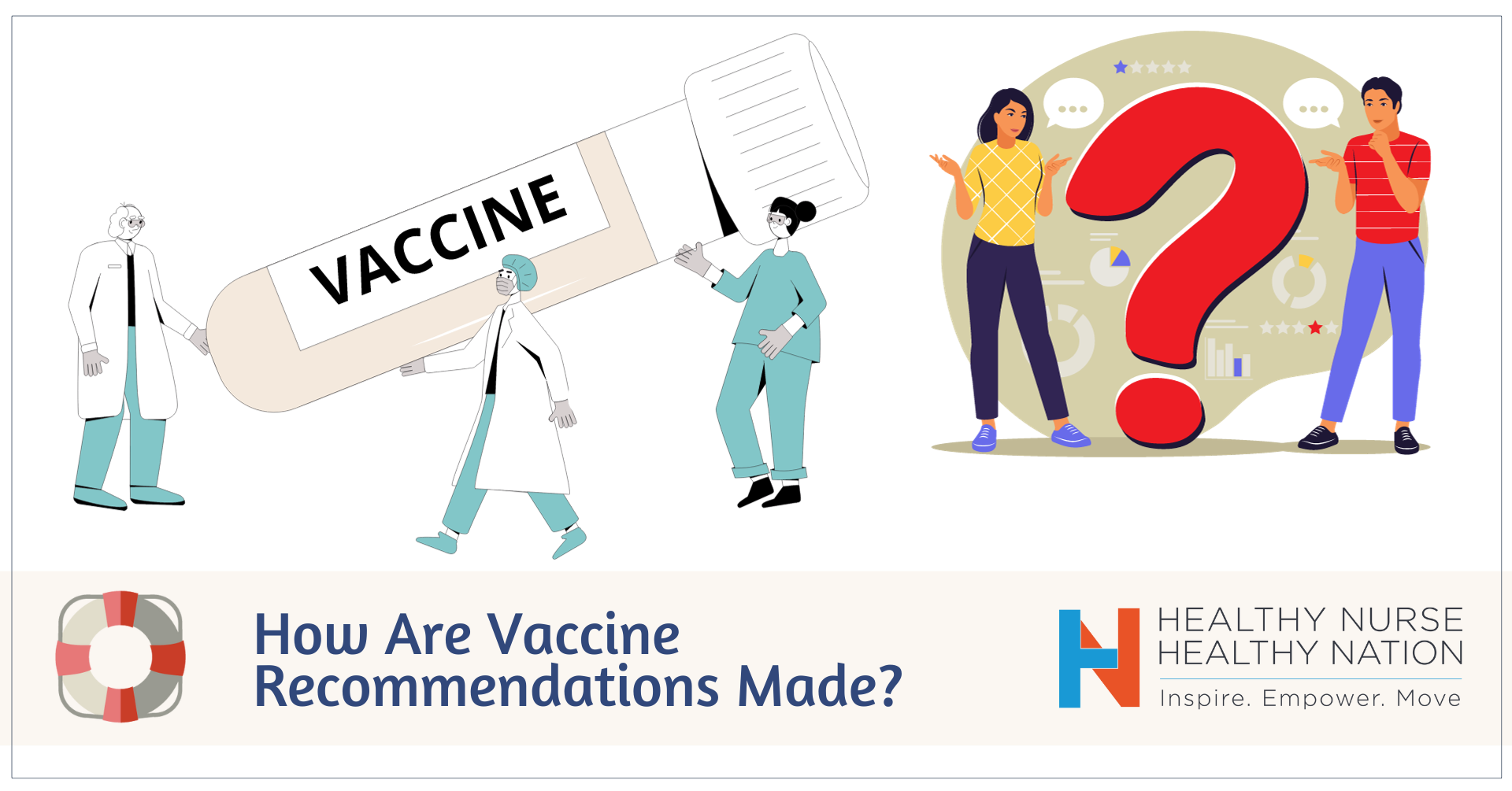Healthy Nurse, Healthy Nation™ Blog - How Are Vaccine Recommendations Made? Understand ACIP’s Process For Making Vaccine Recommendations
Published
As we head into another cold and flu season, we’re also gearing up for immunizations — both for ourselves and our patients. As a nurse, you know you need a flu shot every year, but have you ever wondered where updated immunization recommendations come from?

And what exactly goes into making vaccine recommendations for 335 million people?
They come from the U.S. Center for Disease Control and Prevention’s (CDC) Advisory Committee on Immunization Practices (ACIP). This team of independent experts carefully examines information about the safety and effectiveness of vaccines. ACIP's purpose is to advise the CDC on how to reduce vaccine-preventable illnesses and promote the safe and effective use of vaccines. The group also provides guidance on the proper timing and dosage of all recommended vaccines.
So, when you see a recommendation for an updated COVID-19 vaccine — or a newer immunization like the RSV vaccine for adults — remember that it went through rigorous review from the ACIP.
Which experts are a part of ACIP?
The individuals on the ACIP include 15 voting members chosen by the Secretary of the U.S. Department of Health and Human Services (HHS) after an application and nomination process. A consumer representative sits on the group and offers viewpoints on the social and community effects of vaccination. The committee also includes 8 ex-officio members from various government agencies and 30 non-voting representatives from other organizations with vaccination expertise.
“This committee is comprised of subject matter experts from medical or public health backgrounds,” says Infection Preventionist Paul Gentile MPH, CIC, FAPIC. “It’s a dynamic group of individuals from the American Academy of Pediatrics (AAP), American Academy of Family Physicians (AAFP), American College of Physicians (ACP), American College of Obstetricians and Gynecologists (ACOG), and others.”
What’s the ACIP’s process for making a vaccine recommendation?
Vaccine recommendations in the United States change as new scientific research and data become available, but major updates to the recommended schedule usually only happen annually or biennially. The ACIP can provide more immediate updates in response to emerging infectious disease threats, like when the COVID-19 vaccine was in development.
To provide well-informed and trustworthy vaccination recommendations, the ACIP’s approach is based on:
- Comprehensive review of scientific data
- Epidemiological insights
- Safety concerns
- Public health effect
- Economic issues
- Data review: ACIP members review scientific studies and research about vaccines, including information on safety, effectiveness, and potential benefits.
- Epidemiology assessment: The committee assesses the spread and impact of diseases that vaccines can prevent to understand their current prevalence and potential risks.
- Public health need: ACIP considers the importance of preventing a disease, especially if it causes severe illness, hospitalizations, or death.
- Vaccine safety: The clinical trial safety data of vaccines are thoroughly examined to ensure that the benefits outweigh any potential risks.
- Economic impact and cost-effectiveness: ACIP evaluates the cost of vaccines, health care savings, and the overall economic impact of preventing diseases.
- Vaccine efficacy: The committee looks at how well a vaccine works in preventing the targeted disease, including its effectiveness over time.
- Public input: ACIP considers input from health care professionals, organizations, and the public during public meetings.
Once approved, the CDC publishes the ACIP immunization recommendations as official guidelines in the Morbidity and Mortality Weekly Report (MMWR).
How do the ACIP immunization recommendations reinforce confidence in the safety and effectiveness of vaccines?
All vaccine recommendations come from a well-rounded team of experts who use a rigorous review process. This is reassuring to all Americans — including health care professionals — because it tells us that the available vaccines are safe and effective.
ACIP recommendations are rooted in the methodical analysis of scientific research, clinical trials, and real-world data. This evidence-based approach assures health care professionals and the public that recommendations are not arbitrary — they’re based on arduous evaluation.
“ACIP is constantly reviewing scientific literature, clinical trial data, and vaccine development processes,” says Gentile. “The information is vetted through multiple channels and groups before getting approved.”
For anyone who is still skeptical or wants to hear the data for themselves, ACIP meetings are open to the public and the group is transparent in their decision-making process. This openness fosters trust by allowing people to witness the deliberations, discussions, and justifications behind the recommendations.
How can nurses empower their patients with this information?
“There are many misconceptions about vaccines and where they come from,” says Gentile. “It’s important that health care workers understand and use this ACIP background information to educate other colleagues and patients on the safety and credibility of the recommendations.”
When explaining immunization recommendations to patients, lean on the facts. The ACIP recommendations are:
- Rooted in scientific research and data: This evidence-based foundation equips you with trustworthy information to educate patients.
- Developed by a respected panel of experts recognized by health care institutions and the public: You can leverage this credibility to reinforce the importance of vaccines and answer patient questions with reliable information.
- Meant to address common concerns about vaccine safety and effectiveness: You can use this information to alleviate patient worries and misconceptions, fostering informed decision-making.
- Tailored for specific populations, such as children, those who are pregnant, and immunocompromised individuals: You can tailor your education efforts to the unique needs of each patient group, making it more relevant to individual patients.
*** See the ACIP’s current vaccine recommendations for all ages. For more information on how the ACIP makes vaccine recommendations, watch this video.
Project Firstline for Infection Prevention
The general public expects health care professionals to stay up-to-date on the recommended vaccines and vaccine safety. To help with this effort, ANA collaborated with the CDC to launch Project Firstline, an interactive series of free online resources that provide infection prevention and control (IPC) training and information. Best practices for dealing with COVID-19 and other infections, as well as evidence-based information on vaccination safety, are all part of the Project’s comprehensive education.
The CDC also offers many resources for health care professionals to better understand the ACIP recommendations, vaccination schedules, storage and handling, and vaccine administration.
As a nurse, you have a valuable toolkit at your disposal. The ACIP immunization recommendations can help you provide accurate, trustworthy, and comprehensive vaccine education to patients. Draw on the ACIP recommendations to foster care and build trust with your patients. Use them to explain that all recommendations align with nationally recognized standards for vaccine use.
How do you plan to educate your patients about the ACIP’s immunization recommendations?
Share with us in our private Facebook group, on Twitter or Instagram. Tag us with #healthynurse.

Not a member of Healthy Nurse, Healthy Nation yet?
Join today! Sign up for our monthly challenges!
Updated and reviewed 7/9/2024
Blog Safety
09/13/2023 8:37am CDT



Post a Comment or Question